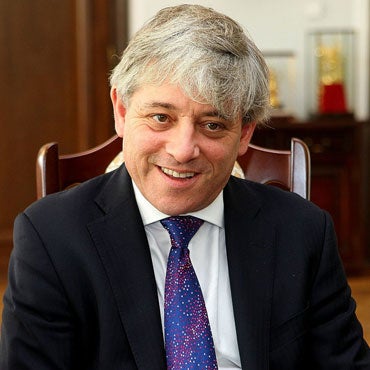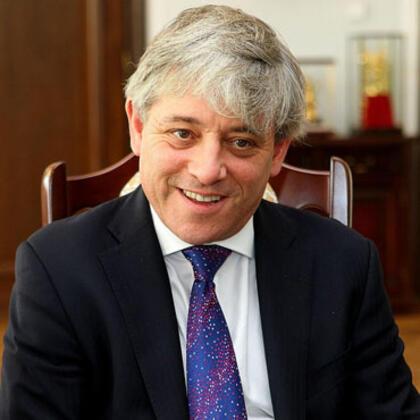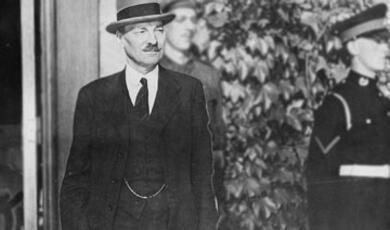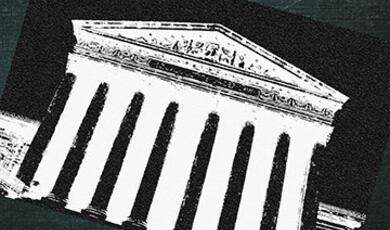Parliament and the Public: Strangers or Friends?
Share
- Details
- Text
- Audio
- Downloads
- Extra Reading
How can the House of Commons engage more effectively with the public which it serves? Can modern technology assist this enterprise?
This is the 2012 Gresham Special Lecture.
The other Gresham Special Lectures can be accessed here:
2013 - The New Face of Europe by Sir Richard Lambert
2011 - Reinventing the Wheel by Sir Adam Roberts
2010 - The Challenges of the new Supreme Court by the Rt Hon the Lord Philips
2009 - The Ascent of Money by Professor Niall Ferguson
2008 - Early Christianity and Today by the Archbishop of Canterbury
2007 - The Beauty of Holiness and its Perils by Sir Roy Strong
2006 - Walking the Line by Baroness Kennedy of the Shaws
2005 - Should we trust the Scientists by Professor the Lord Winston
2004 - Science in a complex world by Sir Martin Rees
2002 - Towards freedom from hunger by Professor M S Swaminathan
2001 - Commerce and Culture in the Late 20th Century by Professor Charles Saumarez Smith
2000 - A Global Ethic - A Challenge for the New Millennium by Professor Hans Küng
Download Text
20 June 2012
Parliament and The Public:
Strangers or Friends?
The Rt Hon John Bercow MP
It is a huge pleasure and privilege to be with you here this evening. The history of the Gresham lecture series is long and distinguished. This Special Lecture is a relatively recent innovation, having been established in 1985, but I am flattered by the company that I am keeping in being able to speak to you tonight through this particular platform. This is, I appreciate, a very eminent audience and I hope that the words that I am about to deliver are worthy of it. This is the sort of place and opportunity where a speaker should take the chance to say what he or she really thinks about a major issue and risk a little controversy in so doing if that seems necessary. This I intend to do tonight.
The title of my talk this evening is “Parliament and the Public: Strangers or Friends?” The answer to that question, in my opinion, is either both or neither. Both, in the sense that there is a strong familiarity between Parliament and the public but there are also areas of substantial mutual misunderstanding. Neither, in the sense that the best word to describe the relationship between the two is not strangers or friends, but acquaintances instead. I think this is an unfortunate outcome. It would be better if Parliament better understood the public and the public better understood Parliament. What I want to do tonight is set out what Parliament is seeking to do to reconnect itself with the country that it serves and what I believe needs to be addressed if the public is to make the most of this relationship.
In doing all of this I want to take on what I find to be a common misperception about Parliament in general and the House of Commons in particular – a misperception of which I have been increasingly conscious since I was elected Speaker. It is the widespread view that Government and Parliament are more or less indistinguishable. This is emphatically not the case. The truth is that Parliament is not the Government and the Government is not Parliament. The Government is drawn from Parliament under our political system and is accountable to Parliament but it is institutionally separate and fundamentally distinct from Parliament. This confusion is, however, endemic and the essence of my argument this evening will be that we have to embed parliamentary studies in our education system from a very young age. This is probably, but not essentially, achieved through a new revised notion of “citizenship” in our school curriculum if we are to have a democracy in which people understand the institution for which they cast their ballots and have a basis for deciding whether it is functioning in a fashion which they deem acceptable and satisfactory. The blunt and brutal truth is that we do not at the moment have that level of shared comprehension. And it is for this reason that our Parliament and the public are on one level both strangers and friends and at another can be deemed mere acquaintances.
Let me start though with Parliament itself. Parliament has absolutely no right to expect or to demand the attention, let alone the sympathy of the public. The Age of Deference died some time ago and on the whole this was a mercy killing. The House of Common is entitled neither to column inches in newspapers nor to specific minutes on television news broadcasts. If for the two or three decades or so before the 2010 general election Parliament appeared to be marginalised in the media and elsewhere and considered a less consequential actor in the national theatre than it had been, then it was the role of Parliament not to condemn such perceptions but to change them. Parliament has to prove constantly that it is worthy of respect and that it is relevant to the world beyond Westminster. There have been times in recent memory when it did not seem to be especially concerned about its declining reputation. The absolute nadir was reached three years ago with the revelations that became the expenses scandal. The House of Commons was faced with a choice between rapid change and permanent contempt. It did then choose to adopt quite radical reforms in the shape of recommendations from a committee led by Tony Wright, the then MP for Cannock Chase, and their adoption, although not exactly awarded enormous publicity, when combined with the fresh blood offered by 228 new MPs elected in May 2010 has made a real difference. The novelty of a coalition administration has also created an element of unpredictability that has also made the House of Commons a stronger institution. These have been very exciting times.
To my mind, however, Parliament has to meet three crucial requirements to be relevant to the public.
The first is the obligation to be topical, to be discussing the same issues that matter to the country as a whole and not conducting a private dialogue in our own language. To be recklessly honest once more, this has not always been the case. Parliament can be the prisoner of its own procedures. Much of our vocabulary is arcane and the reasons why business is conducted in the matter that it is, and often for entirely rational reasons, appear close to incomprehensible to those outside of Westminster itself. We have too often satisfied ourselves with “general debates” that are very general indeed and then do not always strike the electorate as the most consequential items of conversation. If we are not topical then we will not appear relevant and if we seem irrelevant then Parliament and the public are indeed destined to be strangers. It has been one of my principal objectives as Speaker, deploying the limited amount of overt power and covert influence at my disposal, to realign Parliament and the public in this regard. This is true as much for our style as for our substance. No one dislikes the boorishness, the dubious decibel democracy, often associated with Prime Minister’s Questions, for example, more than I do.
What does topicality mean in this instance? It does not mean slavishly following every newspaper headline. A very large part of what we do involves legislative scrutiny and such scrutiny is not show business. When it comes to ministerial scrutiny, as opposed to the specifics of legislative scrutiny, it is wise to heed the mood of the public and to reflect its interest. If there are unacceptably lengthy queues at Heathrow Airport, to take a recent incident of note, it is right that public concerns are directed to ministers through Parliament and not simply aired through the press, and that ministers have to explain in and to Parliament what the public can expect them to do about the problem. This should not have to wait until the next round of specific Home Office questions, which might be three or four weeks away, or for some general debate about immigration and passport control. The arguments should be tested immediately. Until recently Parliament was not always especially effective in this regard.
It was and is to remedy this that as Speaker I have deliberately re-invented the Urgent Question or UQ. The Urgent Question is a long-established parliamentary device which enables any Member of Parliament to petition the Speaker to call a minister to the House, often at but a few hours’ notice, to answer on a matter which has emerged very recently. That question and answer then triggers further questions to the minister concerned allowing many MPs the chance to put their points across to him or her for approximately half an hour, the precise allocation of time decided by the Speaker, not least according to the level of interest. This weapon in the parliamentary arsenal was never wildly popular with ministers, whips or Governments, let alone those responsible for departmental diaries across Whitehall, and had fallen into disuse in the first decade of this century. In the 12 months before I was elected Speaker in June 2009, precisely two Urgent Questions had been awarded to Members of Parliament. Two was not the sort of number to strike fear into the hearts of those who carry ministerial red boxes. It suggested a Parliament that was not merely disengaged from public concerns but almost agnostic about politics itself. It was surreal.
I have quite openly sought to reverse this situation. In the past three years I have allowed 99 UQs. The Urgent Question is now a crucial part of parliamentary life once more and a formidable device if deployed effectively not just for shadow ministers looking to embarrass their opposite numbers but backbench MPs on both sides who are determined to extract instant answers on an immediate issue. It has had the further virtue that the media are obliged to report that ministers said what they said on a topic of considerable salience in the House of Commons to MPs and not on the Today Programme or outside the House on College Green which frankly was becoming an alternative and rival to the chamber of the House of Commons. The public can see Parliament in action on matters of importance to them. I think the UQ has transformed the functioning of the House and that it is an innovation that is here to stay.
The principal of topicality has to rely on more than one instrument. In fairness, across the activities of the House it is becoming more prominent. We are shifting from longer very general debates towards short more specific discussions about matters which motivate the public and not the political class alone. Select Committees, empowered and emboldened by reforms which mean that their Chairs are elected by the whole House not hand-picked by the whips offices and to which all other members are elected by their fellow members of the parliamentary party, have become far more inquisitorial in character. They have also taken on subjects such as the telephone hacking scandal that has consumed News International that would once have been considered too hot to handle. The House Backbench Business Committee, a body which did not even exist three years ago, has allowed parliamentary time to be dedicated to matters that people really do talk about on the proverbial Clapham Omnibus. This is not always a delight to the government of the day but it should be a source of satisfaction to the electorate. In the coming year we will see the creation of a House Business Committee which, in time, should serve to democratise the timetable of the House of Commons further, which will again assist the cause of topicality. If we maintain this momentum, Parliament really will be capable of engaging with the public as if friends.
The second aspect of this is teamwork between Parliament and the public. There has to be a stronger direct connection between our agenda and the input of the interested citizen. We are in the process of pioneering e-petitions to allow the public to play a part in deciding directly what our debates should be. This is an area where we need to move with a little caution to avoid a parliamentary version of mob rule but it is plainly an experiment worthy of exploration. Select Committees now actively invite submissions from the public as a whole and not only the usual suspects and vested interests on the issue concerned and that is a trend which we should encourage further. We have also opened up Parliament as an institution with record numbers of visitors, dedicated tours for those with a special enthusiasm and weekend opening during the summer, a practice which was stopped, bizarrely, after the murder of Airey Neave in 1979 and not revived until some three decades later. Parliament is owned by the public and should be open to it. We held the first Parliament Week last Autumn which was a fantastic success and should make us more confident about further acts of engagement. We need to be continuously looking at new means of drawing the public in to Parliament and constantly asking ourselves whether, to take one example, our language is a barrier to this exercise. It was for this reason that I established a Speaker’s Advisory Council on Public Engagement and asked it to think the unthinkable for and to us.
The third essential element of Operation Relevance is technology. In everything we do we need to realise that new technology is our friend and should allow Parliament to draw closer to the public. The parliamentary website, for example, is an absolutely fantastic resource, which should be seen as a national archive and treasure. The Parliament Channel and the BBC’s brilliant Democracy Live which provides coverage of the House of Commons, House of Lords, select committee hearings, the Scottish Parliament, the Welsh Assembly, the Northern Ireland Assembly and the European Parliament is something that we should really champion and develop. The House is on Facebook and Twitter and we can do a lot more in that regard to boot. We have also undertaken some truly bold innovations. These include “MP for a Week” a wonderful computer game aimed at children aged 11-14 but beloved of many an adult as well which takes the player through the choices and challenges faced each week by parliamentarians. Technology is the bridge between Parliament and the public who put us there.
So we could be even more ambitious in this regard. We can use technology to ensure that more people watch parliamentary proceedings, that those proceedings are better understood and that the public can become directly engaged with their MPs and parliament. Many MPs are active bloggers and frequent users of Twitter and find this a highly efficient means of communicating with their constituents. I do not think that this in any sense devalues Parliament or our democracy. Quite the opposite. As I argued to the Political Studies Association in Belfast earlier this year I believe that we live in a dynamic democracy where electors want to do more than exercise their franchise once every five years but where an element of delegation to political representatives remains unavoidable and desirable. About the surest path for Parliament to render itself a stranger rather than a friend to the public is through an arrogant elitism that it should be allowed to carry on its business as if behind closed doors and act more in the manner of a private club than a public institution. It was that mentality which led to the subtle erosion of the authority of Parliament over ministers and a climate in which the expenses debacle occurred.
Put together these three themes – topicality, teamwork and technology – are a tremendous foundation for a far more intimate relationship between Parliament and the public in the future than in the past. The truth, nonetheless, is that we have only really started in all three areas. Until very recently we were some distance behind the Scottish Parliament in many of these regards and we still need to do more. As an illustration of this, I am the first Speaker of the House of Commons who has considered it to be part of his core mission to conduct visits and make speeches to institutions and societies across the whole of the United Kingdom. This was not because my predecessors were inarticulate, bone idle or travel-sick but because the expectations which surrounded the office reflected a wider culture within Westminster that the outside world owed it a living. There has been a sea-change in thinking which I could not welcome more forcefully and which I am determined to embody. Parliament has to get out of its comfort zone and has to reach out to the public by travelling to it, not expecting the reverse to occur. Or, put differently, we need to put the Commons back in to the House of Commons and so be relevant.
Will topicality, teamwork and technology be enough to move the relationship status, as they put it on Facebook, away from mere “acquaintances” towards something which really could be called “friends”? I think the candid answer to this is “not entirely”. The onus has to be on Parliament to make the first moves, which as I have outlined it is doing, but we would be fooling ourselves if we thought that alone was sufficient. The measures I have set out are the means by which Parliament and those parts of the British public who are most interested in discovering more about us as an institution and in becoming involved with what we do make that alliance happen. Unfortunately, this does not include everyone. All the topicality, teamwork and technology on offer will not ensure that Parliament is understood and a matter of discussion in every street, every shopping outlet or every sure start centre in the land. We have to have the basis for a broader appreciation about what Parliament does and why Parliament matters. This is essential if the conflation of Government and Parliament is to be corrected.
This has to start with our schools. I am not a fan of nostalgia, which is not what it used to be, or fond of sweeping generalisations along the lines of “young people today”. Nor do I intend to join the tediously long line of people who seem to achieve some warped sort of satisfaction attacking teachers. I recognise that the composition of the national curriculum is a controversial subject, not least that part of it which David Blunkett promoted under the banner of “citizenship”, strongly influenced by Professor Bernard Crick, when he was the Secretary of State for Education in the first Blair Government. This is not a partisan battlefield that I enter with any excessive enthusiasm. There is almost nothing that I can say here which could not be contorted as “Speaker attacks someone or other”. Such is life. What I am about to say, however, is a sincere observation that I strongly believe needs to be made and is not aimed at or intended to be a criticism let alone an attack on any particular minister, policy or political party. It is instead a statement of what I consider to be an important fact about our public life.
It is that from what I can see we do not teach the essence of constitutional civics with the same intensity and impact as appears to be the case in the United States, other European nations or even many of the Commonwealth countries which have to some degree adopted the Westminster Model of democracy. In the United States it is absolutely central to schooling that students understand the essence of what the President, the Congress and the Supreme Court are and do and the basics of how a Bill becomes a law. In Britain it is actually possible not merely to travel through eleven or thirteen years of formal schooling without knowing the difference between a First Reading and a Second Reading or what is Royal Assent, it is possible to pass through three or four years of university without this knowledge and even, in an extreme case, to acquire a degree in Politics without encountering the core of UK constitutional studies.
To put it mildly, this is a lamentable state of affairs. I think it is vital that we achieve a national consensus that we want this to change. I do not see any reason why it should not be possible to reach cross-party agreement on this. Much of what I am proposing involves elementary process not partisan positioning. There are plenty of international examples upon which we could draw. Furthermore, as I have just set out, it can no longer be claimed that the resources required for this do not exist or would be expensive to assemble. We have the tools required via the parliamentary website, through Democracy Live and in the form of generationally relevant educational aides such as “MP for a Week” to construct such a course. If the collective institutional will exists then we could transform parliamentary education in our schools.
I am not suggesting that other subjects would need to be jettisoned to do this or that vast amounts of time would need to be taken. Nor am I implying that parliament is the only element of our democracy which is worthy of such a focus. I think we as a society would all benefit from a shared knowledge of what ministers do, how devolution works in Britain, what are the differences between central and local government in our country, where the policy boundaries within the institutions of the European Union lie and why democracy is important and something to be cherished. I will tomorrow have the immense honour of welcoming Aung San Suu Kyi to the House of Commons to make a major speech in the historic setting of Westminster Hall. The people of Burma do not need any reminder of the significance of democracy or, in their sad case, the absence of it. In Britain we often appear to be blasé about democracy and our democratic institutions. We treat it rather like we do our weather, something that just happens. We need to be more knowledgeable citizens than we are. Parliament is central to that understanding.
I do not mind whether or not it is described as citizenship but we do need a revolution in civics teaching. We should not accept ambitions which are less than those of the United States or standards which would not be tolerated in France or Germany. This should require no more than thirty minutes a week for schoolchildren between the ages of 7 and 16 although it would be invaluable if this time could be supplemented by Democracy or Parliament clubs meeting at lunchtimes or after school hours. The real boom in School Councils and the activities of the UK Youth Parliament show there is an appetite for this. I do not believe that we would be force-feeding our children a democratic education against their will.
This should, therefore, be our objective. We should want all of our children to leave school as capable of identifying the difference between the Government and Parliament as we should want them to read, to write and be numerate. It is not an outrageous proposition. I would like to propose further that it should be our aim to ensure that every child in the country visits either Westminster or, if more practical for them, their devolved legislature in Edinburgh, Cardiff and Belfast but ideally Westminster as well at some stage in their school life. If we need to raise commercial sponsorship to provide the funding for such an initiative then I am more than happy to be the one who starts shaking the can for it. I cannot think of anything that would cement the connection between Parliament and the public more than this. It will take time but we are capable of transmitting the importance of democracy and of Parliament in a much better fashion than we presently achieve. We have to raise our sights and our game.
When and how should all this activity start? The short answer is as soon as possible but there is a more sophisticated and symbolic means to this end. The year 2015 is the 800th anniversary of the signing of the Magna Carta and the 750th anniversary of the date – 1265 – which is generally recognised as the foundation of Parliament. It seems to me that this represents a real opportunity for a Year of Parliament and a Year of Democracy in our schools and in the country at large. This would serve as the catalyst for a new approach to and emphasis on the constitutional fundamentals within our school curriculum.
It is also a strategy which is entirely in keeping with the spirit of these Gresham Lectures. It has been a fantastic opportunity to be with you tonight and I admire your patience in listening to me. I know that a real passion for democracy and public education exists in this audience which is why I wanted to take this occasion to put my case forward. Parliament and the public should not be strangers or even only acquaintances but the firmest of friends. I have felt among friends tonight. Thank you once again.
© John Bercow 2012
This event was on Wed, 20 Jun 2012
Support Gresham
Gresham College has offered an outstanding education to the public free of charge for over 400 years. Today, Gresham College plays an important role in fostering a love of learning and a greater understanding of ourselves and the world around us. Your donation will help to widen our reach and to broaden our audience, allowing more people to benefit from a high-quality education from some of the brightest minds.


 Login
Login







